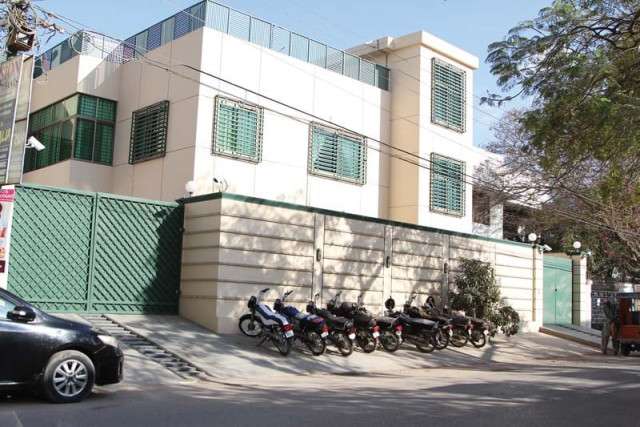Fighting addiction: Take this road to recovery with ARC treatment centre
AAS Recovery Centre opens its doors today to men battling addiction

The centre, which opens today, offers to fight addiction in a professional way. PHOTOS: AYSHA SALEEM/EXPRESS
Perhaps this is what the AAS Recovery Centre (ARC), which is opening today (February 1), plans to achieve. It wants to 'provide the warmth of a home,' says an official showing around the facility.
Located on main Sharae Faisal near the Kentucky Fried Chicken, the three-storey ARC building stands tall. The 20-bed facility hopes to help affluent men battle addiction in a course of six weeks.
"We are not interested in the money part but we will provide high-end treatment," explains ARC chairperson Abdul Rehman Allana. Three of their counsellors are getting training from England and a British therapist, Steph Noble, will be stepping in to provide service.
Noble, who worked for 28 years at Broadway Lodge treatment centre in the UK, said that, while she finds the kind of drug use similar, she is moved by young ages of the users, and that is something she has not seen in the UK.
The 12 steps
Addicts, both fighting drugs and alcohol, will be treated using a 12-step programme to overcome their addiction. Originating from the US in the 1930s, the 12-step programme is a spiritual process, different from more traditional medical and psychiatric methods.
When you climb the stairs at ARC's treatment centre, all these 12 steps are mentioned along the staircase.
The first step is for the client to admit that one is powerless over addiction, explains Allana. This is followed by a belief that a Power greater than themselves can restore them to sanity. The last step is having a spiritual awakening as a result of following the previous steps and passing on this message to other addicts. He puts it as "the feeling that we are powerless and there is a higher being."

The 12-step programme will include group and one-on-one counselling as well as specialised recreational therapies. The physiological aspects of addiction will be addressed through professional and thorough detoxification.
Along with counselling, the ARC will make their clients follow a strict schedule, which will include therapies, such as yoga, fitness instruction and reading and socialising in a recreational space.
Separate and sound proof therapy rooms have been established, points out ARC administration head Sadia Babur Baig. Since withdrawal can trigger suicide attempts, special care has been taken that no sharp objects or glass is present, she adds. "The beds have flat edges, there is no string on the curtains, etc."
Alleviate Addiction Suffering trust
Allana, an industrialist, set up the Alleviate Addiction Suffering (AAS) trust in 2000 after he saw friends and family suffering from addiction. He felt, however, that it was the poor who needed help as they couldn't afford to treat themselves.
Today, he has treatment centres curing street children and underprivileged adults, as well as half-way houses providing rehabilitation and vocational training. "There is more addiction today than before and six per cent of the population in Karachi is using drugs of some kind," he says.
Among the affluent, the use of cocaine is greatly on the rise. One gramme of cocaine can cost Rs12,000, he points out, adding that a person high on this drug may end up spending up to Rs350,000 every month. A person who cannot afford such expensive drugs will, however, spend up to Rs20,000 on cheaper drugs, such as heroin or hashish.
Allana has also seen a change in the addiction of street children. In 2006, when he set off to treat child addicts, he found them addicted to glue-sniffing, and less than five per cent of them were using drugs. Today, 75 per cent of such children are hooked on to hashish and 25 per cent to heroine.
"They take drugs to hide their pain," he says, sharing the story of a boy who became an addict when he was only seven. "His elder brother, who was a drug addict, used him as a sex worker to make money. The parents were dead."
But addiction is something that people are suffering from regardless of their social and economic status. Allana says that many rich people are trying to battle addiction, which they may resort to due to employment or marital problems.
"Availability [of drugs] has become so easy," he says. "There needs to be more awareness against drugs and more treatment centres to fight this."
Published in The Express Tribune, February 1st, 2016.


















COMMENTS
Comments are moderated and generally will be posted if they are on-topic and not abusive.
For more information, please see our Comments FAQ